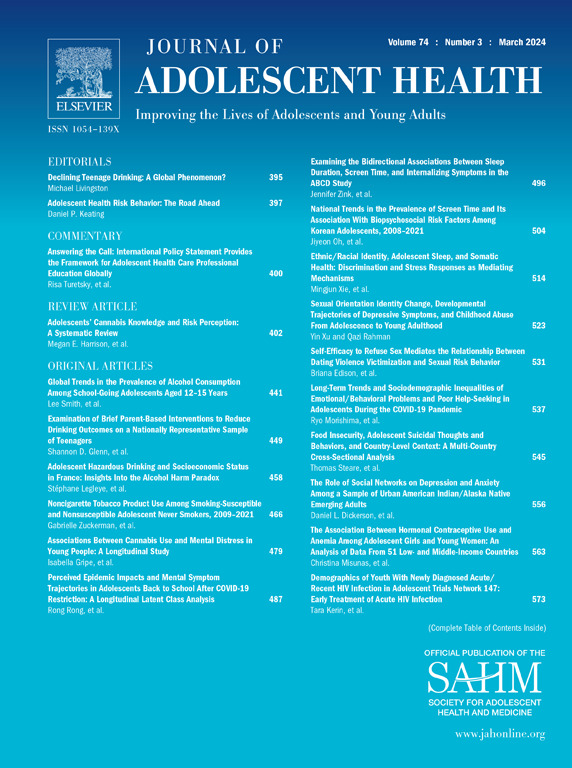种族主义和歧视如何影响黑人年轻女性的性健康?种族和性成见对受教育机会的影响》。
IF 5.5
2区 医学
Q1 PEDIATRICS
引用次数: 0
摘要
目的:结构性种族主义和种族歧视可能会增加黑人少女性健康的不良后果。然而,在定性研究中,种族主义对性健康的影响还没有得到很好的描述。本研究旨在探讨结构性种族主义的定义,并确定种族歧视的经历如何影响黑人少女的性健康和性决策:方法:从一项正在进行的纵向研究中招募了 13-19 岁的黑人女孩。在虚拟焦点小组和个人访谈的帮助下,询问了对结构性种族主义的理解、遭受歧视的经历以及影响性健康决策和寻求医疗保健的因素。访谈记录由两名独立的盲人小组成员进行专业誊写和编码。采用专题内容分析法确定新出现的主题:出现了以下四个主题:(1) 美国的奴隶制和医学种族主义影响了黑人女孩的性与生殖健康(SRH)选择;(2) 对黑人女孩的刻板印象和过度性化被认为是性与生殖健康教育的障碍;(3) 成年人既是性与生殖健康和资源利用的障碍,也是其促进因素;(4) 黑人女孩在做出性与生殖健康决定时经常从朋友或社交媒体上寻求信息:黑人女孩的生殖健康教育应结合系统性压迫的历史影响。从业人员应将生殖正义纳入其中,以便在临床和社区空间建立信任。让护理人员参与健康教育可减少青少年参与护理的障碍。本文章由计算机程序翻译,如有差异,请以英文原文为准。
How Racism and Discrimination Impacts Black Young Women’s Sexual Health: The Influence of Racial and Sexual Stereotypes on Educational Access
Purpose
Structural racism and racial discrimination may increase adverse sexual health outcomes in Black adolescent girls. However, the influence of racism on sexual health has not been well-described in qualitative studies. The purpose of this study was to explore definitions of structural racism and determine how experiences of racial discrimination impact sexual health and decision-making in a sample of adolescent Black girls.
Methods
Black girls aged 13–19 years were recruited from an ongoing longitudinal study. Virtual focus groups and individual interviews were facilitated, inquiring about understandings of structural racism, experiences with discrimination, and factors that influence sexual health decision-making and healthcare-seeking. Transcripts were professionally transcribed and coded by two independent, blinded team members. Thematic content analysis was used to identify emergent themes.
Results
Four themes emerged as follows: (1) slavery and medical racism in the United States impact the sexual and reproductive health (SRH) choices of Black girls; (2) stereotypes and oversexualization of Black girls are considered a barrier to SRH education; (3) adults serve as both barriers and facilitators to SRH and resource utilization; and (4) Black girls often seek information from friends or social media outlets to make SRH decisions.
Discussion
Reproductive health education for Black girls should integrate historical influences of systemic oppression. Practitioners should include reproductive justice to build trust in clinical and community spaces. Engaging caregivers in health education may reduce barriers for youth to engage in care.
求助全文
通过发布文献求助,成功后即可免费获取论文全文。
去求助
来源期刊

Journal of Adolescent Health
医学-公共卫生、环境卫生与职业卫生
CiteScore
10.40
自引率
3.90%
发文量
526
审稿时长
46 days
期刊介绍:
The Journal of Adolescent Health is a scientific publication dedicated to enhancing the health and well-being of adolescents and young adults. Our Journal covers a broad range of research topics, spanning from the basic biological and behavioral sciences to public health and policy. We welcome a variety of contributions, including original research papers, concise reports, literature reviews, clinical case reports, opinion pieces, and letters to the editor. We encourage professionals from diverse disciplines such as Anthropology, Education, Ethics, Global Health, Health Services Research, Law, Medicine, Mental and Behavioral Health, Nursing, Nutrition, Psychology, Public Health and Policy, Social Work, Sociology, and Youth Development to share their expertise and contribute to our mission of promoting adolescent health. Moreover, we value the voices of young individuals, family and community members, and healthcare professionals, and encourage them to submit poetry, personal narratives, images, and other creative works that provide unique insights into the experiences of adolescents and young adults. By combining scientific peer-reviewed research with creative expressions, our Journal aims to create a comprehensive understanding of the challenges and opportunities in adolescent and young adult health.
 求助内容:
求助内容: 应助结果提醒方式:
应助结果提醒方式:


